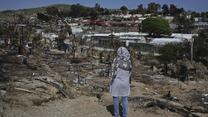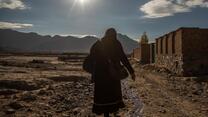The International Rescue Committee (IRC) works with vulnerable migrants in Niger, Libya and Italy, along what has become known as the Central Mediterranean Route (CMR), which stretches from Sub-Saharan Africa to Italy via Libya. People moving along this route do so for a range of reasons. Whatever first drove them to leave, they are all ultimately exposed to significant risks on the journey, including exploitation and abuse at the hands of people smugglers and security services. This report aims to draw greater attention to the humanitarian crisis facing people on the move along the CMR, and to offer insights into the impact of EU interventions on the situation they find themselves in.
It includes the IRC's ‘Ten Point Action Plan’ for EU leaders to promote a values-driven approach to migration on the route, highlighted below:
1. Improve access to lifesaving services for vulnerable migrants along the Central Mediterranean Route
The EU-AU-UN Migration Taskforce should provide greater financial and logistical support to agencies delivering outreach services to address the health and psychosocial needs of vulnerable migrants at different points along the Central Mediterranean Route, to ensure a coordinated response that is able to reach the most vulnerable. This includes working with the Libyan Government of National Accord (GNA) and the House of Representatives to ensure they establish a registration system for all those detained in Libya (including at proposed disembarkation points) and adopt a Protection Guarantee to ensure the provision of gender segregated areas, appropriate sanitation and hygiene facilities, access to legal aid, health services and adequate food and non-food items in all government-run facilities. Special provisions must be made to provide protection and services for children travelling alone – an estimated 26,095 children are currently unaccompanied in Libya. At sea borders, the focus must remain on saving lives and facilitating effective collaboration amongst vessels operating in the Mediterranean, in full respect of fundamental rights.
2. Protect and empower women and girls along the Central Mediterranean Route
Women and girls are particularly vulnerable to abuse and exploitation, for example, roughly 80 per cent of the female Nigerians reaching Italy and other countries in the EU in 2016 were victims of sex trafficking.The EUTF for Africa should invest in specific programming to support the safety and wellbeing of women and girls by providing access to sexual and reproductive health care, gender segregated sanitation facilities, safe spaces for women and girls at reception points, and appropriate medical care, counselling and legal services for survivors of GBV. These protection measures should be integrated alongside programming to economically empower women through livelihoods support, access to cash and financial services, and collaboration with local women’s organisations and communities to tackle harmful gender norms that inhibit economic well-being.
3. Increase humanitarian funding for countries along the Central Mediterranean Route
The EU can build on the political momentum generated by the International High Level Conference on the Sahel that it hosted in Brussels in February this year to increase pledges in support of the 2018 Humanitarian Response Plan (HRP) for the Sahel, which is currently only 19.4 per cent funded for Libya and 33 per cent funded for Niger. It should also continue to work with other key stakeholders, such as the League of Arab States (LAS), to provide the required additional US$250 million for Libya and US$338 million for Niger.
4. Ensure EU asylum processing procedures are principled and humane
The right to asylum was born in Europe and the EU has a duty to continue to uphold these standards as it asks them of other countries through the Global Compact for Refugees. Before moving forward with the current proposal for ‘regional disembarkation platforms’ or other forms of external processing centres outside of the EU, the EU has a responsibility to fully address four key areas of concern: legality, safe and humane conditions, access to the centres, and access to due process, over which numerous questions remain.
5. Increase access to resettlement in the EU
The EU has the capacity to immediately double its emergency resettlement pledges for the CMR to 8,000 places by the end of 2018, in addition to current pledges under the Union Resettlement Framework. This target is 20 per cent of UNHCR’s global call of 40,000 emergency places for the route, reflecting the EU’s combined Gross Domestic Product (GDP), which is approximately 20 per cent of global GDP. Greater investments can also be made to shorten the waiting period for people evacuated under the ETM to ensure they are not left in limbo in processing centres.
6. Support a ‘prosperity package’ for Libya and Niger
The EUTF for Africa should refocus its selection of projects to deliver an integrated ‘prosperity package’ that includes job creation, market support, cash relief and entrepreneurship programmes, underpinned by a clear set of outcomes and indicators to measure progress towards safety, poverty alleviation and resilience for migrants and host communities. This rebalance of priorities is crucial, especially as EU development funds are increasingly delivered via the EUTF for Africa.Reforming the governance of the EUTF for Africa to establish collective outcomes between donors, national governments, civil society and the private sector through their increased participation in planning, implementation and evaluation will catalyse greater long term impact, policy coherence and investment.
7. Support labour mobility across the Central Mediterranean Route
The EU has a clear opportunity to encourage member states to establish bilateral programmes with Sahel states to facilitate temporary labour movement to the EU via the Seasonal Workers Directive (or any similar national legislation). This will both meet the needs of EU businesses and support the flow of remittances back into the region. The EU-AU-UN Migration Taskforce should also encourage Libya to revisit efforts made in 2012 to establish a national migration policy, through a joint migration action plan with the GNA and the House of Representatives to increase access to work permits for migrants, as part of the country’s transition to peace and stability.
8. Promote alternatives to detention in Libya
The EU is well placed diplomatically and economically to maintain political pressure on the Libyan GNA and the House of Representatives to develop alternatives to the detention of migrants; for example, through the establishment of open centres where UNHCR, IOM, NGOs, and lawyers can assist people with essential services and support durable solutions. Whilst detention centres remain operational, the EU should maintain pressure for full access for the UN and NGOs to provide essential services
9. Strengthen accountability for human rights abuses along the Central Mediterranean Route
The EU can utilise current migration management partnerships with border authorities in Libya and Niger to strengthen adherence to protection principles and human rights. The EU should include mechanisms to independently monitor the safe and humane treatment of vulnerable migrants by border authorities and coastguards, as an integral part of EU-funded projects to strengthen border management, and increase accountability by withdrawing funding where breaches of agreed standards are uncovered.
10. Enshrine the rights of migrants in the new Libyan constitution
As part of the EU’s stated objectives to advance the political process in Libya and assist in its democratic transition, it should work with partners in the Libyan Quartet to ensure the GNA and the House of Representatives establish a legal framework for providing asylum and protecting victims of trafficking in the new constitution. This should include the ratification of the 1951 Convention and Protocol Relating to the Status of Refugees, and full recognition of the role of UNHCR.



